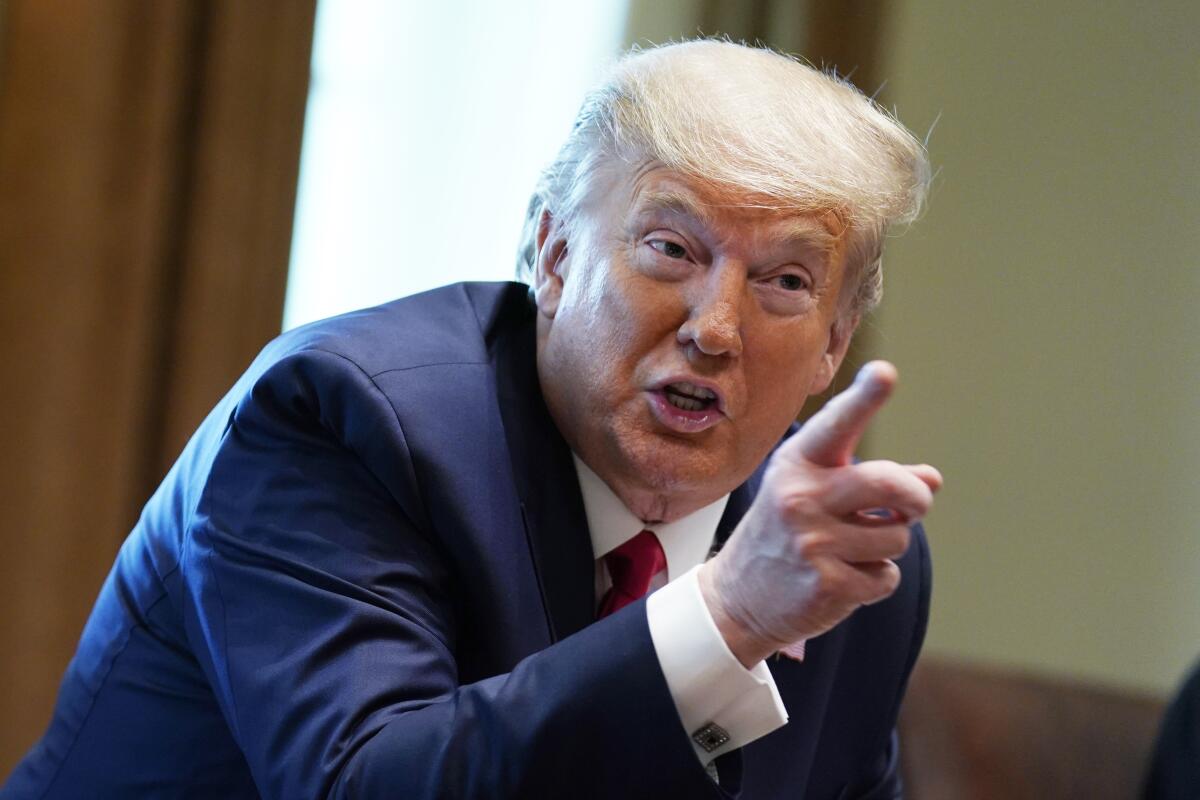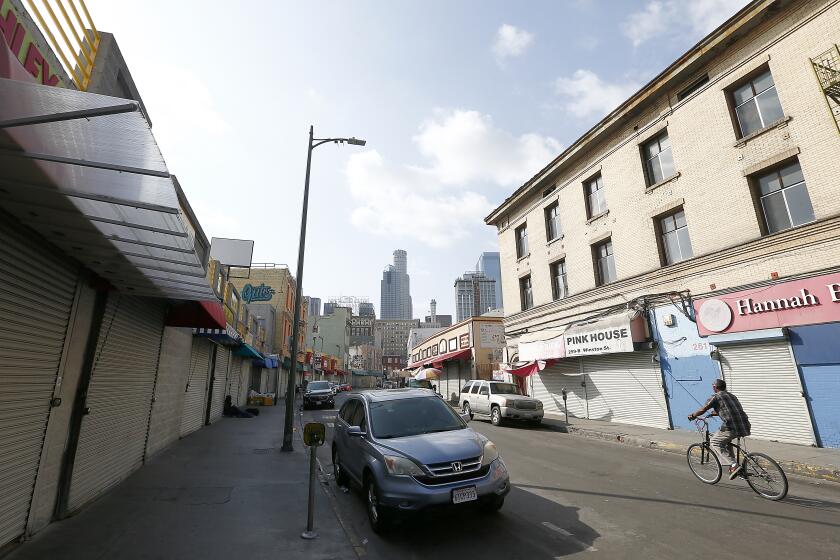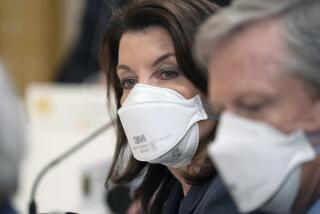‘We don’t have a king’: Governors in states slammed by coronavirus hit back at Trump

- Share via
The battle between President Trump and governors over how and when to relax coronavirus restrictions continued Tuesday with more angry words from both sides.
Reiterating his claim of “total authority,” Trump started the day with a series of tweets that, among other things, compared any resistance from the states to a “good old fashioned mutiny.”
“Tell the Democrat Governors that ‘Mutiny On The Bounty’ was one of my all time favorite movies,” he tweeted.
Within hours, prompted by reporters’ questions, New York Gov. Andrew Cuomo fired back.
“We do not have a king in this country,” Cuomo said at his daily news conference. “That has been a topic discussed since our founding fathers … we didn’t want a king, so we have a Constitution.”
At a combative, at times bizarre, White House briefing Monday night, the president expressed his eagerness to reopen the economy and stated that he had the power to dictate actions at the state level.
Though constitutional experts say the president does not have such authority, Trump continued with his assertions Tuesday morning, focusing his ire on Cuomo, whose state has lost more than 10,000 people to COVID-19, the disease caused by the novel coronavirus.
“I got it all done for him, and everyone else, and now he seems to want Independence!” Trump tweeted. “That won’t happen!”
Cuomo acknowledged that he had sought help from the White House before and that states would continue to need federal assistance during the coronavirus crisis. He suggested that he would rather not fight with Trump.
“There’s too much to do for everyone,” he said.
Nationwide, more than 25,000 people have died of COVID-19, according to Johns Hopkins University. New York has suffered the brunt of the outbreak with more than 10,050 deaths.
But many of the hardest-hit states — including New Jersey, Massachusetts, Michigan and California — have reported a slowing in key indicators such as hospitalizations, intensive-care patients and intubations. So the quarrel among Trump and governors was indicative of an overall trend that saw officials looking toward the next phase of the pandemic and wondering what conducting business and returning to school might look like.
With widespread testing viewed as essential, New York City Mayor Bill de Blasio announced a deal with private companies and universities to produce 100,000 additional test kits per week beginning next month.
“We’ve had a big breakthrough,” he said. “That’s going to be a major, major step forward for this city.”
Iowa Gov. Kim Reynolds said confirmed COVID-19 cases in her state have risen, fueled by several new outbreaks. At least 38 people have died in the state, according to Johns Hopkins. Though numbers are not expected to peak until the end of the month, Reynolds has been working with a major packing plant, shuttered after dozens of employees fell ill, in hopes that operations can resume.
“It’s incredibly important because that is part of the food-supply chain,” Reynolds said.
In Ohio, where more than 270 people have died, officials have asked business owners to look ahead, envisioning ways to reopen that will make employees and customers feel safe. Gov. Mike DeWine cautioned that, even as the pandemic subsides, conditions will be “far from ideal.”
“Until there is a vaccine, there is going to be a monster around us,” he said. “Coronavirus, as far as we can tell, is still going to be here. It is still going to be, for some people, deadly.”
Although Trump has issued national recommendations advising people stay home, it has been governors and local leaders who have instituted mandatory restrictions, including shuttering schools and closing nonessential businesses. Some of those orders carry fines or other penalties, and in some jurisdictions they extend into the early summer.
Under growing criticism for his administration’s laggard response to the coronavirus, President Trump has upped his efforts to blame others — including the WHO, Dr. Anthony Fauci, China, governors and the media.
Trump’s Monday comments came soon after leaders in the Northeast and along the West Coast announced separate state compacts to coordinate their efforts to scale back stay-at-home orders or reopen businesses on their own timetables.
In the East, New York, New Jersey, Connecticut, Pennsylvania, Delaware, Massachusetts and Rhode Island agreed to coordinate their actions. The governors of California, Oregon and Washington announced a similar pact, saying they will work together and put their residents’ health first and let science guide their decisions.
Trump’s claim that he could force governors to reopen their states represented a dramatic shift in tone. For weeks, he argued that states, not the federal government, should lead the response to the crisis. He refused to publicly pressure states to enact stay-at-home restrictions, citing his belief in local control of government.
Connecticut Gov. Ned Lamont told CNN that “verbal hand grenades from the president” should not distract from progress he has made in discussions with Vice President Mike Pence. After a morning telephone call with Pence, New Jersey Gov. Phil Murphy attempted to downplay Trump’s earlier tweets.
“I was wondering,” he said. “Was it the Charles Laughton ‘Mutiny on the Bounty’ or the Marlon Brando ‘Mutiny on the Bounty?’”
Disagreements notwithstanding, Murphy emphasized that states will need help as they seek to loosen restrictions. He said: “There’s no substituting for that big gorilla in the room, the federal government.”
Though Cuomo agreed, he vowed to claim his state’s sovereignty if the president enacted any policies that seemed harmful or reckless.
“That would be the argument,” the New York governor said. “The Constitution. I would call Alexander Hamilton.”
The Associated Press contributed to this report.
Gov. Gavin Newsom and others discuss how the economy could restart. But President Trump claims that he, not local and state officials, has that power.
More to Read
Sign up for Essential California
The most important California stories and recommendations in your inbox every morning.
You may occasionally receive promotional content from the Los Angeles Times.












